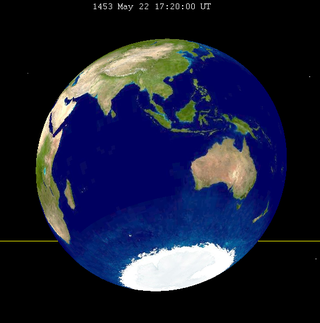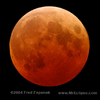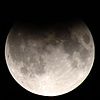- May 1453 lunar eclipse
-
A partial lunar eclipse occurred on May 22, 1453.
Contents
Observations
It was seen during the Fall of Constantinople (the capture of the capital of the Byzantine Empire), during the siege that lasted from Thursday, 5 April 1453 until Tuesday, 29 May 1453), after which the city fell to the Ottomans. The lunar eclipse was considered to be fulfilling a prophecy for the city's demise. It is said a blood moon took place during the eclipse.
Visibility

The partial eclipse was visible from, Africa, Asia, and Australia.References
External links
- www.economist.com The fall of Constantinople, Dec 23rd 1999
- www.wordinfo.info: A Lunar Eclipse that Contributed to the Fall of Constantinople
Lunar eclipses Lists of
eclipsesAll: Central total eclipses · Total penumbral eclipses
By century: 20th BCE · 19th BCE · 18th BCE · 17th BCE · 16th BCE · 15th BCE · 14th BCE · 13th BCE · 12th BCE · 11th BCE · 10th BCE · 9th BCE · 8th BCE · 7th BCE · 6th BCE · 5th BCE · 4th BCE · 3rd BCE · 2nd BCE · 1st BCE · 1st · 2nd · 3rd · 4th · 5th · 6th · 7th · 8th · 9th · 10th · 11th · 12th · 13th · 14th · 15th · 16th · 17th · 18th · 19th · 20th · 21st · 22nd · 23rd · 24th · 25th · 26th · 27th · 28th · 29th · 30th
Saros cycles: 100 · 101 · 102 · 103 · 104 · 105 · 106 · 107 · 108 · 109 · 110 · 111 · 112 · 113 · 114 · 115 · 116 · 117 · 118 · 119 · 120 · 121 · 122 · 123 · 124 · 125 · 126 · 127 · 128 · 129 · 130 · 131 · 132 · 133 · 134 · 135 · 136 · 137 · 138 · 139 · 140 · 141 · 142 · 143 · 144 · 145 · 146 · 147 · 148 · 149 · 150 · 151 · 152 · 153 · 154 · 155 · 156 · 157 · 158 · 169 · 160 · 161 · 162 · 163
Total
eclipsesPast1910 May 24 · 1913 Sep 15 · 1920 May 03 · 1921 Apr 22 · 1928 Jun 3 · 1939 May 3 · 1946 Jun 14 · 1950 Apr 2 · 1953 Jan 29 · 1953 Jul 26 · 1954 Jan 19 · 1956 Nov 18 · 1957 May 13 · 1957 Nov 7 · 1960 Mar 13 · 1960 Sep 5 · 1963 Dec 30 · 1964 Jun 25 · 1964 Dec 19 · 1967 Apr 24 · 1967 Oct 18 · 1968 Apr 13 · 1968 Oct 6 · 1971 Feb 10 · 1971 Aug 6 · 1972 Jan 30 · 1974 Nov 29 · 1975 May 25 · 1975 Nov 18 · 1978 Mar 24 · 1978 Sep 16 · 1979 Sep 6 · 1982 Jan 9 · 1982 Jul 6 · 1982 Dec 30 · 1985 May 4 · 1985 Oct 28 · 1986 Apr 24 · 1986 Oct 17 · 1989 Feb 20 · 1989 Aug 17 · 1990 Feb 9 · 1992 Dec 9 · 1993 Jun 4 · 1993 Nov 29 · 1996 Apr 4 · 1996 Sep 27 · 1997 Sep 16 · 2000 Jan 21 · 2000 Jul 16 · 2001 Jan 9 · 2003 May 16 · 2003 Nov 9 · 2004 May 4 · 2004 Oct 28 · 2007 Mar 3 · 2007 Aug 28 · 2008 Feb 21 · 2010 Dec 21 · 2011 Jun 15
Future2011 Dec 10 · 2014 Apr 15 · 2014 Oct 8 · 2015 Apr 4 · 2015 Sep 28 · 2018 Jan 31 · 2018 Jul 27 · 2019 Jan 21 · 2021 May 26 · 2022 May 16 · 2022 Nov 8 · 2025 Mar 14 · 2025 Sep 7 · 2026 Mar 3 · 2028 Dec 31 · 2029 Jun 26 · 2029 Dec 20 · 2032 Apr 25 · 2032 Oct 18 · 2033 Apr 14 · 2033 Oct 8 · 2036 Feb 11 · 2036 Aug 7 · 2037 Jan 31 · 2040 May 26 · 2040 Nov 18 · 2043 Mar 25 · 2043 Sep 19 · 2044 Mar 13 · 2044 Sep 7 · 2047 Jan 12 · 2047 Jul 7 · 2048 Jan 1 · 2050 May 6 · 2050 Oct 30
Partial
eclipsesPast1903 Apr 12 · 1914 Mar 12 · 1932 Mar 22 · 1952 Feb 11 · 1952 Aug 5 · 1954 Jul 16 · 1955 Nov 29 · 1956 May 24 · 1958 May 3 · 1959 Mar 24 · 1961 Mar 2 · 1961 Aug 26 · 1963 Jul 6 · 1965 Jun 14 · 1970 Feb 21 · 1970 Aug 17 · 1972 Jul 26 · 1973 Dec 10 · 1974 Jun 4 · 1976 May 13 · 1977 Apr 4 · 1979 Mar 13 · 1981 Jul 17 · 1983 Jun 25 · 1988 Mar 3 · 1988 Aug 27 · 1990 Aug 6 · 1991 Dec 21 · 1992 Jun 15 · 1994 May 25 · 1995 Apr 15 · 1997 Mar 24 · 1999 Jul 28 · 2001 Jul 5 · 2005 Oct 17 · 2006 Sep 7 · 2008 Aug 16 · 2009 Dec 31 · 2010 Jun 26
Future2012 Jun 4 · 2013 Apr 25 · 2017 Aug 7 · 2019 Jul 16 · 2021 Nov 19 · 2023 Oct 28 · 2024 Sep 18 · 2026 Aug 28 · 2028 Jan 12 · 2028 Jul 6 · 2030 Jun 15 · 2034 Sep 28 · 2035 Aug 19 · 2037 Jul 27 · 2039 Jun 6 · 2039 Nov 30 · 2041 May 16 · 2041 Nov 8 · 2042 Sep 29 · 2046 Jan 22 · 2046 Jul 18 · 2048 Jun 26
Categories:- Lunar eclipses
Wikimedia Foundation. 2010.


